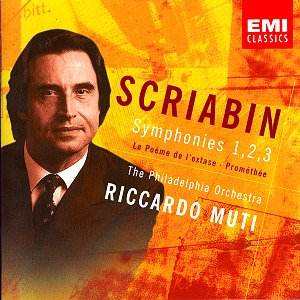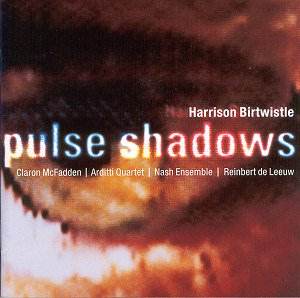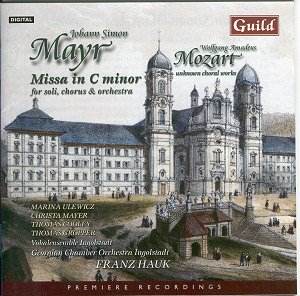 Composer: Alexander SCRIABIN (1872-1916)
Composer: Alexander SCRIABIN (1872-1916)
Works: Symphony No. 1 (1901), Symphony No. 2 (1902), Symphony No. 3 Divine Poem (1905), Poem of Ecstasy (1908), Prometheus – Poem of Fire (1910)
Performers: Stefania Toczyska (soprano), Michael Myers (tenor), Frank Kaderabek (trumpet), Dmitri Alexeev (piano), Westminster Choir, Choral Arts Society of Philadelphia, Philadelphia Orchestra/Riccardo Muti
Recording: Memorial Hall, Fairmount Park, Philadelphia, Feb 1985 (Symphony No. 1), Feb 1989 (Symphony No. 2), March 1990 (Divine Poem), Apr 1988 (Poem of Ecstasy), Apr 1990 (Prometheus)
Label: EMI
Scriabin’s symphonic output occupies a unique space within the late Romantic canon, characterized by a synesthetic approach that fuses musical structure with philosophical and metaphysical ideologies. The works presented in this collection, spanning from his First Symphony to the bold and visionary “Prometheus,” illustrate Scriabin’s evolution as a composer, transitioning from the influences of Tchaikovsky and Rachmaninoff to a more personal and transcendent idiom. Riccardo Muti’s interpretations invite listeners to explore the rich harmonic landscapes and evocative soundscapes that Scriabin meticulously crafted.
Muti’s conducting reveals a profound understanding of Scriabin’s musical language. The First Symphony, often overshadowed by his later works, emerges with a Mahlerian scale that Muti handles deftly. The last two movements display a remarkable tension between despair and triumph; Muti’s control over the tempo and dynamics allows the music to breathe, particularly in the Allegro, where the undulating theme seems to oscillate between resignation and hope. The Philadelphia Orchestra’s brass section shines, with Kaderabek’s trumpet entries adding a luminous quality to the orchestral texture.
In the Second Symphony, Muti continues to navigate the introspective nature of the score with an assurance that brings out the Rachmaninov-like melancholy in the Andante, while the Maestoso’s grandeur resonates with echoes of Glazunov. The interpretative choices here are particularly insightful, as Muti balances lyrical passages with the darker undertones that permeate the symphony. The orchestral balance, enhanced by EMI’s excellent engineering, allows the listener to appreciate the intricate interplay of instruments, particularly the clarity of the woodwinds and the power of the strings.
The “Poem of Ecstasy” is perhaps the most demanding of these pieces, requiring a conductor who can capture its shifting moods and expansive dynamics. Muti rises to the challenge, crafting a performance that captures both the sensuality and spirituality inherent in the score. The meticulous dynamic contrasts he employs are evident in the climactic moments, where the orchestral texture swells and recedes with a fluidity that is breathtaking. A notable highlight occurs around 6:30, where Kaderabek’s trumpet soars above the orchestral waves, asserting its presence with a raw, imperious sound that encapsulates the work’s essence.
The Third Symphony, while structurally more conventional, benefits from Muti’s ability to infuse even slender thematic material with vitality. The “Jeu Divin” segment moves briskly, showcasing the Philadelphia Orchestra’s brilliance, particularly their brass, which consistently elevates the overall impact of the performance.
“Prometheus,” the final work in this collection, is a tour de force, with Dmitri Alexeev’s piano performance embodying both defiance and rhapsodic introspection. His playing aligns seamlessly with Muti’s vision, creating a tapestry of sound that recalls the grandeur of Bax and Griffes. The engineering of this recording captures the complexity of the orchestration, ensuring that no detail is lost, whether it be the delicate interplay of the strings or the bold declarations of the brass.
This set stands as a definitive collection of Scriabin’s symphonic works, not merely for its comprehensive inclusion of these pieces but for Muti’s compelling interpretations that breathe new life into them. The sound quality is excellent, with a clarity that enhances the listening experience, making it a must-have for those wishing to explore the profound depths of Scriabin’s oeuvre. Collectively, Muti and the Philadelphia Orchestra offer a vibrant and insightful portrayal of these compositions, illuminating the path of a composer whose music remains as enigmatic as it is alluring.



